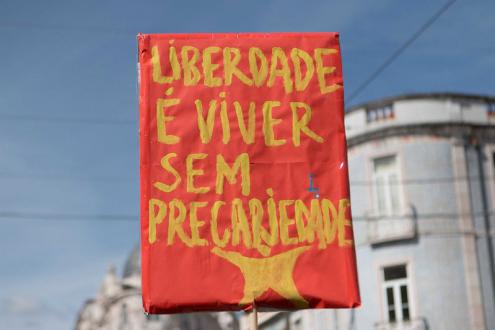Under the motto “Fight Precarity, Eradicate Poverty”, the Counter-Summit will strenghten networks of resistance and solidarity – while the official “Social Summit” is promoted by the European Commission and the Portuguese Presidency, the same European powers that have been complacent with the poverty increase.
The Social Summit will be held in Porto on 7 May. Hosted by António Costa, representing the Portuguese Presidency of the European Council, and Ursula von der Leyen, President of the European Commission, this meeting will gather top-level political leaders and will also be attended by representatives of trade unions and employers, and international organisations such as the OECD and the International Labour Organisation (ILO). The goal is to highlight the importance of the European Pillar of Social Rights, through a commitment between heads of state, “social partners” and civil society organizations, and to give a new impulse to the Pillar of Social Rights, through a Declaration on the associated Action Plan proposed by the European Commission (which will be approved at an informal Meeting of Heads of State on 8 May).
A European Pillar of Social Rights has been advocated in the European context since 2015, given the extent of the outrageous imbalance between the priority given to growth and the little attention paid to fighting inequalities. Approved in Göteborg in 2017, the Pillar of Social Rights sets out 20 principles, divided into three main areas: i) equal opportunities and access to the labour market; ii) fair working conditions; and iii) social protection and inclusion. Since then, no truly significant progress has been made, apart from pompous, grandiloquent declarations of no consequence.
The Pillar of Social Rights and its Action Plan lacks ambition, concrete targets and strength within the European Union’s institutional architecture. In fact, it is the rules of the European Treaties driving the European Union with an economic policy rooted in liberal dogmas and the rules of the European Semester preventing countries from making investment choices, that lay down the regulations subordinating all policies to a 3 percent deficit target (now temporarily suspended given its inadequacy) and subjecting national State budgets to the pressure and boycott of the European Union.
This Social Summit will be another moment of performance, as no fundamental change in European policy is on the table. Rather on the contrary: the European institutions now wave the flag of the Pillar of Social Rights and, though some of the principles contained therein are unquestionably fair, labour precariousness has not ceased to worsen, assuming new and radical forms of deprotection and deregulation being imposed under the pretext of “digitisation of the economy”; poverty is constantly increasing and there are currently more than 93 million poor people in the European Union, many of whom are workers that fall below the poverty line; and there is no fair climate transition plan submitting the logic of accumulation to the demands of the planet and social justice. Moreover, the intervention of the European institutions has been to counteract national policies aiming at increasing minimum wages and to oppose, for example, the reversal of the legacy that austerity policies present in labour legislation and social protection in countries such as Portugal, Spain or Greece. On the other hand, the announced banner of this Social Summit, a reduction of 15 million poor people by 2030, is symptomatic of the state of the European Union. By assuming and being satisfied with such a goal, the Portuguese Presidency prepares to brandish as a major social commitment to have, by 2030, an Europe with 76 million poor people. In other words, this entails an absolutely conformist approach to the issue of poverty, already declared a violation of human rights -, but which continues to be treated as inevitable and natural.
Originally published at the website of Esquerda.net (modified).
Programme
6th May
16:00 – 20:00 : Tour around Porto’s B side
A guided tour through the Historic Centre – gentrification and right to housing – conducted by Sérgio Aires (Prior registration up to 30 people).
20:00 – 22:30 : Dinner and cinema
With the presence of Fabíola Cardoso (MP of Bloco de Esquerda – European Affairs) at Passos Manuel (or open air space – CCOP).
22:30 : Talk with homeless people at Batalha Square
With the presence of Sérgio Aires, Susana Constante Pereira, Teresa Bispo and Jorge Costa.
7th May
Passos Manuel Cinema
10:00 : Openning
Luís Fazenda (Bloco’s leader – International Department)
José Gusmão (Bloco’s MEP)
Heinz Bierbaum (President of the Party of the European Left)
Manon Aubry (Co-president of The Left in the European Parliament)
10:30 – 12:30 : Digital transition, platform work and fighting precariousness
Moderator: José Soeiro
Short documentary: “Estafados: stories of normalized precariousness” (6 minutes)
Leïla Chaibi – France Insoumise (France)
Nuria Soto (Plataforma Riders X Derechos Barcelona – Intersindical Alternativa de Catalunya)
Teresa Coelho Moreira (Jurist, Green Paper on the Future of Work)
Maria da Paz Lima (Labour researcher/ Eurofound)
Fernando Fidalgo (Leader of Sindicato dos Trabalhadores de Transportes Rodoviários e Urbanos de Portugal / Transporte individual e remunerado De passageiros em Veículos descaracterizados a partir de plataforma Eletrónica)
14:00 – 16:00 : Economic justice, full employment and work with rights
Moderator: Conceição Sereno
Yolanda Diaz (Minister of Labour Spanish Government)
Rafael Mayoral (Member of the Spanish Congress, Spokesperson of PODEMOS and Secretary of Civil Society and Popular Movement)
Francisco Louçã (Economist)
Manuel Carvalho da Silva (CoLABOR)
Nelson Silva (Comissão dos Trabalhadores Rádio e Televisão de Portugal and National Council CGTP)
Ana Miranda Paz (Bloque Nacionalista Galego MEP)
16:30 – 18:30 : Struggles for Equality, Social Protection and Poverty Eradication
Moderator: Sérgio Aires
Jordi Estivill (Member of the Solidarity Economy Network of Catalonia)
Graciela Malgesini (European Anti-Poverty Network)
José Manuel Boavida (President of the Association for the Protection of Diabetics in Portugal)
Teresa Bispo (Coordinator of NPISA Lisboa)
Liliana Rodrigues (Researcher)
21:00 : Final speeches
Heinz Bierbaum (President of EL)
Catarina Martins (National coordinator of Bloco)
Sérgio Aires (Bloco’s candidate for the local elections 2021)
